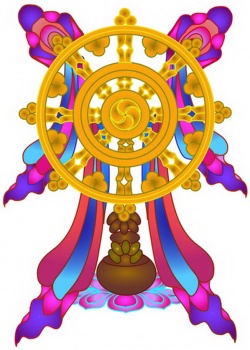Difference between revisions of "Kokāliya Sutta"
(Created page with "<nomobile>{{DisplayImages|1831|1973}}</nomobile> Kokālika Sutta 1. Kokālika Sutta (Kokāliya) (See Kokālika 2).-The story of Kokālika - accordin...") |
|||
| Line 8: | Line 8: | ||
1. [[Kokālika Sutta]] ([[Kokāliya]]) | 1. [[Kokālika Sutta]] ([[Kokāliya]]) | ||
| − | (See [[Kokālika]] 2).-The story of [[Kokālika]] - according to Buddhaghosa (SnA.ii.473), to be distinguished as Cūla Kokālika. | + | (See [[Kokālika]] 2).-The story of [[Kokālika]] - according to [[Buddhaghosa]] (SnA.ii.473), to be {{Wiki|distinguished}} as [[Cūla Kokālika]]. |
| − | It contains the verses preached by the Buddha to [[Kokālika]]. | + | It contains the verses [[preached]] by the [[Buddha]] to [[Kokālika]]. |
| − | The verses describe the evil of back-biting and the terrors that await the back-biter after death. | + | The verses describe the [[evil]] of back-biting and the terrors that await the back-biter after [[death]]. |
| − | The Sutta Nipāta contains twenty-two verses (657-78). | + | The [[Sutta Nipāta]] contains twenty-two verses (657-78). |
| − | The Sutta Nipāta Commentary says (p.477f) that the last two stanzas are not explained in the [[Mahā Atthakathā]], and that therefore they did not belong to the original sutta. | + | The [[Sutta Nipāta]] Commentary says (p.477f) that the last two [[stanzas]] are not explained in the [[Mahā Atthakathā]], and that therefore they did not belong to the original [[sutta]]. |
| − | Of the remaining twenty the last fourteen (663-76) are called by Buddhaghosa the [[Turitavatthugāthā]], and he says that they were uttered by Moggallāna as Kokālika lay dying, by way of admonition, and that, according to others, Mahā Brahma was the speaker. | + | Of the remaining twenty the last fourteen (663-76) are called by [[Buddhaghosa]] the [[Turitavatthugāthā]], and he says that they were uttered by [[Moggallāna]] as [[Kokālika]] lay dying, by way of admonition, and that, according to others, [[Mahā]] [[Brahma]] was the speaker. |
| − | The first three stanzas (658-60) are, in the [[Samyutta Nikāya]] (i.149), attributed to Tudu. | + | The first three [[stanzas]] (658-60) are, in the [[Samyutta Nikāya]] (i.149), attributed to [[Tudu]]. |
| − | In the Anguttara Nikāya (v.171-4; the verses are also found in A.ii.3 and in S.i.149ff; Netti.132), also, Tudu speaks them; but according to this version the Buddha repeats them. | + | In the [[Anguttara Nikāya]] (v.171-4; the verses are also found in A.ii.3 and in S.i.149ff; Netti.132), also, [[Tudu]] speaks them; but according to this version the [[Buddha]] repeats them. |
| − | 2. Kokālika Sutta.-Gives the story of [[Kokālika]] (2) speaking ill of Sāriputta and Moggallāna before the Buddha, of [[Kokālika's]] illness and death, of his admonition by Tudu, and of the announcement of his death and subsequent birth in the [[Paduma-niraya]] by [[Sahampatī]] to the Buddha. | + | 2. [[Kokālika]] Sutta.-Gives the story of [[Kokālika]] (2) {{Wiki|speaking}} ill of [[Sāriputta]] and [[Moggallāna]] before the [[Buddha]], of [[Kokālika's]] {{Wiki|illness}} and [[death]], of his admonition by [[Tudu]], and of the announcement of his [[death]] and subsequent [[birth]] in the [[Paduma-niraya]] by [[Sahampatī]] to the [[Buddha]]. |
| − | A monk questions the Buddha on the duration of suffering in the [[Paduma-niraya]], and the Buddha proceeds to instruct him by means of various illustrations. The sutta ends with the repetition by the Buddha of Tudu's verses. A.v.171-4; also S.i.149ff. | + | A [[monk]] questions the [[Buddha]] on the duration of [[suffering]] in the [[Paduma-niraya]], and the [[Buddha]] proceeds to instruct him by means of various illustrations. The [[sutta]] ends with the repetition by the [[Buddha]] of Tudu's verses. A.v.171-4; also S.i.149ff. |
| − | 3. [[Kokālika Sutta]].-[[Subrahmā]] visits the Buddha at [[Sāvatthi]] and utters verses in reference to [[Kokālika]]. | + | 3. [[Kokālika Sutta]].-[[Subrahmā]] visits the [[Buddha]] at [[Sāvatthi]] and utters verses in reference to [[Kokālika]]. |
The man who tries to limit the illimitable becomes confused. S.i.148. | The man who tries to limit the illimitable becomes confused. S.i.148. | ||
Latest revision as of 01:00, 2 March 2016
1. Kokālika Sutta (Kokāliya)
(See Kokālika 2).-The story of Kokālika - according to Buddhaghosa (SnA.ii.473), to be distinguished as Cūla Kokālika.
It contains the verses preached by the Buddha to Kokālika.
The verses describe the evil of back-biting and the terrors that await the back-biter after death.
The Sutta Nipāta contains twenty-two verses (657-78).
The Sutta Nipāta Commentary says (p.477f) that the last two stanzas are not explained in the Mahā Atthakathā, and that therefore they did not belong to the original sutta.
Of the remaining twenty the last fourteen (663-76) are called by Buddhaghosa the Turitavatthugāthā, and he says that they were uttered by Moggallāna as Kokālika lay dying, by way of admonition, and that, according to others, Mahā Brahma was the speaker.
The first three stanzas (658-60) are, in the Samyutta Nikāya (i.149), attributed to Tudu.
In the Anguttara Nikāya (v.171-4; the verses are also found in A.ii.3 and in S.i.149ff; Netti.132), also, Tudu speaks them; but according to this version the Buddha repeats them.
2. Kokālika Sutta.-Gives the story of Kokālika (2) speaking ill of Sāriputta and Moggallāna before the Buddha, of Kokālika's illness and death, of his admonition by Tudu, and of the announcement of his death and subsequent birth in the Paduma-niraya by Sahampatī to the Buddha.
A monk questions the Buddha on the duration of suffering in the Paduma-niraya, and the Buddha proceeds to instruct him by means of various illustrations. The sutta ends with the repetition by the Buddha of Tudu's verses. A.v.171-4; also S.i.149ff.
3. Kokālika Sutta.-Subrahmā visits the Buddha at Sāvatthi and utters verses in reference to Kokālika.
The man who tries to limit the illimitable becomes confused. S.i.148.
Source
http://www.palikanon.com/english/pali_names/ku/kokaalika_s.htm

